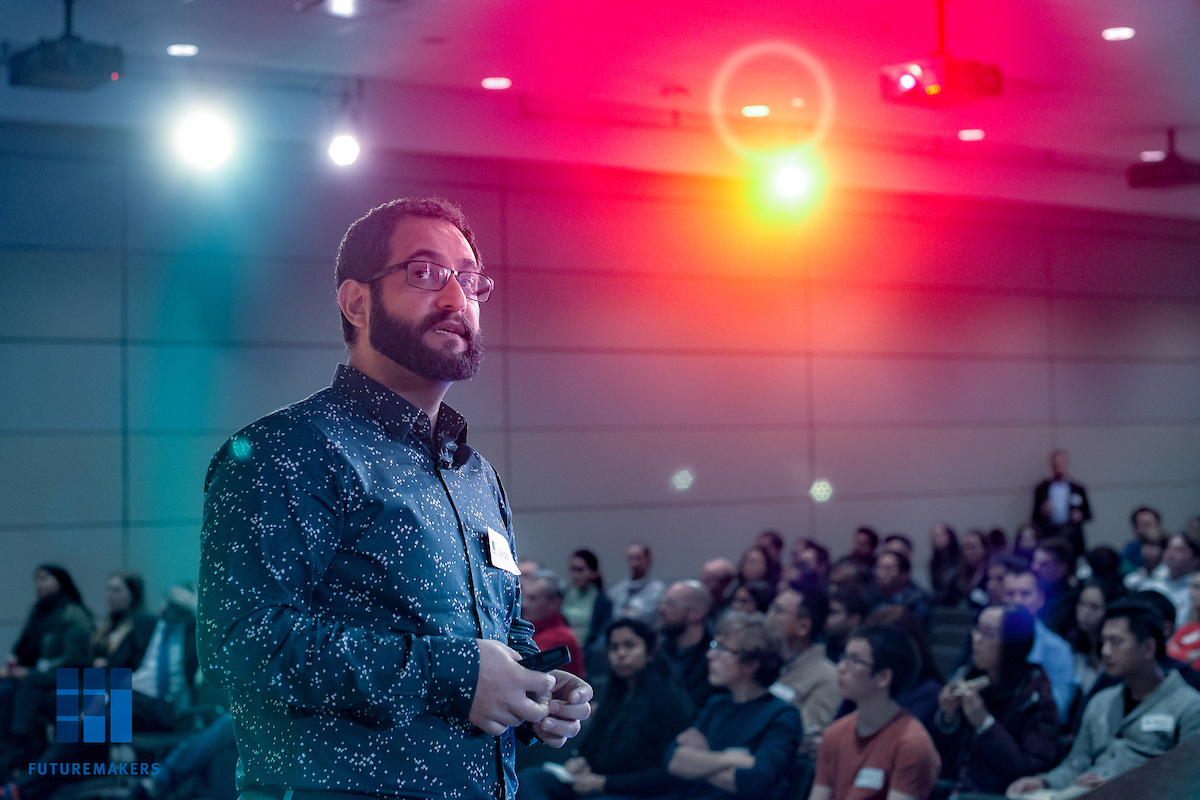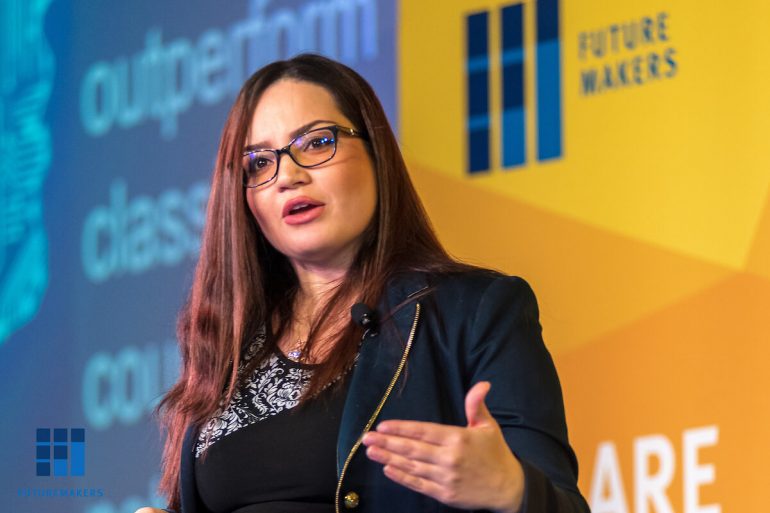Quantum computing may sound like an intimidating topic, but the aim of the November edition of RBC FutureMakers Talks was to bring this topic down to Earth – and explore the development of quantum computing and machine learning within the next few years.
The night opened with Amir Feizpour, a senior manager of data science & analytics at RBC, giving a brief rundown on the basics of quantum computing. In between a prime numbers game meant to demonstrate cryptography and how quantum computing can break down encryption more quickly, Feizpour explained how machine learning gives computers the ability to learn without being programmed by using examples, data, and smart algorithms.
“Emerging technologies are flourishing. And it’s important to have this explorer’s mindset.”
– Tommy Moffatt
Feizpour went on to encourage the room to start thinking of quantum computing in terms of the size of computation. On one hand, computation is a “physical phenomena that’s limited by the physics of your hardware.” But quantum computing isn’t limited by physical space – in fact, because quantum bits can be simultaneously 0 and 1 (and not just 0 or 1 like in classic computation), the space they occupy can be exponentially large.
“The question is: is this a smooth transition in the physics, or is this something that’s going to be drastically different?” Feizpour said.
While asking that question sounds like tackling something “imaginary or far-fetched”, that’s kind of the point. A recurring theme of the night was that the difficulties in developing and investigating quantum computing should not be brushed off as too big or costly, because some of the biggest tech advances – like the World Wide Web and LED – once started as seemingly non-scalable dreams as well.
Xanadu quantum application scientist Razieh Annabestani presented on the current status of quantum technology, and attributed the burgeoning interest in the technology as part of the age-old cycle of curiosity leading to science, then technology, then tools, and back around to curiosity. To aid that curiosity, Annabestani displayed the basic criteria for building a quantum computer (including scalable physical system, coherent control, measurement, multi-qubit gates, and so on) as well as showing a phase estimation algorithm with initialization and gates.
Canadian actor David Hewlett attended FutureMakers Talks and had some sweaty takes on what he learned.
If you are unfamiliar with many of the terms listed above, it should be clear that building a quantum computer isn’t that easy. There’s also the tiny issue that quantum temperatures need to be kept at -270 Celsius and need “a team of scientists and engineers” to operate it, because the particles are so fragile.
“Over the past 30 years, there have been numerous proposals for building a quantum computer,” Annabestani noted. “So far, nobody can say that one is better than another one, because each one has some advantages and some disadvantages.”
“Despite all these challenges, the quantum race is still happening,” Annabestani said, and pointed to industries like cybersecurity and biotech ones buying in to the quantum promise. “Whether it’s happening in five years, 10 years, 20 years, nobody knows. But what we can ask at this moment is that these quantum devices that are built already – they are noisy, but we might still be able to have some competition with them. Depending on the task that it’s given, we need to ask whether these noisy quantum devices outperform the classical ones, or not.”

Knowledge Society innovator Tommy Moffatt gave a talk that started by pointing out how short-sighted the human race can be when it comes to predicting the value of technological innovation. Pundits will claim that the quantum computing revolution is decades away, but be careful what you read, said Moffatt. “This assumes we have all the information about how quantum computing is going to affect society right now.”
Instead, Moffatt presented areas where quantum can help solve problems in ways that classical computers – and humans – could not. One example he provided was molecular simulation, which may be simple for a quantum computer at first, but acts as a good precursor for bigger simulations – ones that can design “smart drugs.” Moffatt described an instance where the information about a disease was put into the simulation, and the algorithm spit out three potential cures, including two nobody had ever heard of before.
“Emerging technologies are flourishing,” Moffatt said. “And it’s important to have this explorer’s mindset.”
Last up were Cordell Grant and Jennifer Elliott, co-founders of QEYnet Inc, to discuss how quantum technology can be used as a force for cybersecurity, not just against it. Grant noted that public key encryption is hard for classical computers, but not quantum computers – so people must turn to quantum key distribution (QKD). The problem is that QKD isn’t widely used because it can’t be set up over long distances, since the transferring photons will break down over fibre cable networks. The solution: satellite networks.
“As a human race, we have a pretty lousy record about predicting the future.”@RBC #FutureMakers
— Driver Chris (@5StarRide) November 29, 2018
Elliott described the best use cases for QKD via satellite, particularly when it comes to securing telecommunications networks dealing with high-value data. QKD is a prime candidate for cloud storage facilities, disaster recovery sites, embassies and consulates with high-value data (because you’re not relying on your host country’s infrastructure), and the national security issue of power plant control systems. Numerous European countries – plus China and Canada – have already started putting QKD satellite missions and testing into use.
“Sometimes people ask, why this push for this technology now? Why is it so urgent that we need to develop it and get it into place as soon as possible? We’re still working on quantum computers and they still have a long way to go,” Elliott said. “And the answer to that is that a lot of the data we have that has value today also has value for a long time into the future.”
BetaKit is a FutureMakers media partner. Photos by Mirna Chacin.

